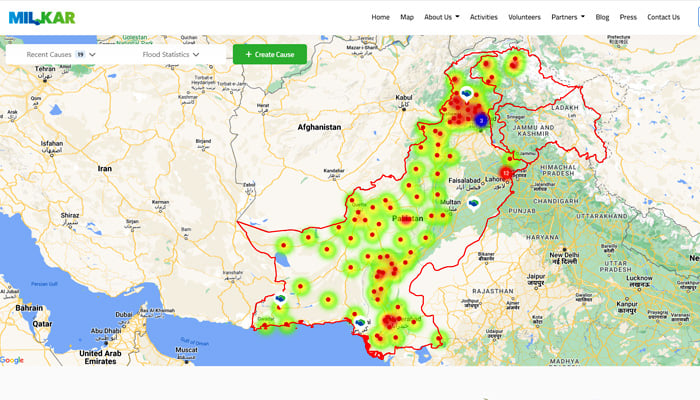Building a case for national youth volunteer program
During last 12 months, close to 8,000 volunteers participated in over 350 community service projects through Milkar
In a mired of heart-wrenching images from the devastation caused by the recent floods in Pakistan, one image has been seared into my memory: two young boys marooned on the rooftop of their house, moments away from being swept away, were rescued by two volunteers who rigged up a small chair lift using a rope and a small bed.
Watching those images, I couldn’t help but wonder what would have happened had these two volunteers didn’t show courage and ingenuity, in a country where the “system” seemed to have abandoned its citizens.
At some level, many of us feel abandoned by the state: over 22 million out-of-school children, 31% unemployed youth, one of the highest infant mortality rates in the world, 21 million people without access to clean drinking water, 60 million people living below the poverty line etc. Wherever one looks, people are waiting to be rescued. But by whom?
Government, alone, cannot do it.
Why can’t all of us step up to help each other, much like the volunteers during the floods? This is a country of young people. Pakistan’s youth can be part of a solution, not part of a problem.
Why not co-opt the youth in solving these problems through a non-partisan national youth volunteer program?
In most countries, community service is a key component of formal education. University admissions expect school students to have carried out substantial community service projects to become eligible for university admissions.
Likewise, companies heavily weigh volunteer work when evaluating candidates for job opportunities. Volunteering is encouraged and supported by governments all over the world.
According to recently published statistics, as much as 53% of Canadians aged 15–24 are involved in volunteering. Over 64 million Americans volunteered this year.
In Pakistan, organizations such as Al-Khidmat Foundation, Akhuwat, TCF, SOS, Teach-for-Pakistan and many others have demonstrated how private sector initiatives can help solve Pakistan’s perennial problems.
Through our platform, Milkar.com, our efforts to connect university and school students and community service projects have reaffirmed our faith that young people are willing and eager to solve the problems faced by their communities. In just the past year, close to 8,000 volunteers participated in over 350 community service projects through Milkar.
Government initiatives, such as Kamyab Jawan, can also provide a non-partisan platform for volunteering. However, for such a program to have a long-term impact, it needs to work with educational institutions to develop a culture of volunteering in the country.
The Higher Education Commission’s (HEC) new guidelines for introducing practical and general education in universities could provide the impetus and structure to formally introduce volunteering opportunities in universities.
At Milkar, we have worked with three universities this year to include community service programs as part of the academic curriculum in the university.
As part of this program, each student completes between 30-80 hours of community service to receive one academic credit as a graduation requirement.
Working with UNDP, HEC and the Youth Ministry, such a program can be expanded to all universities and colleges in the country. Based on our experience of working with the youth of the country, I know they want to be part of the solution.
Muhammad Hadi Saif is a student at Aitchison College Lahore and leads the Milkar Student Volunteer Program.
-
Security forces gun down 30 terrorists in multiple IBOs in KP: ISPR
-
MQM-P calls for new province in Sindh
-
US report validates Pakistan military edge over India: PM
-
Banned TTP poses serious threat to Pakistan security: UNSC panel
-
CM Afridi clarifies remarks on by-poll after ECP requests army deployment
-
Dubai sees 3.2m Pakistani passengers in 2025 as airport sets new milestone
-
Security forces kill 23 Indian proxy terrorists in KP's Kurram
-
Pakistan to construct island to boost oil exploration: report












